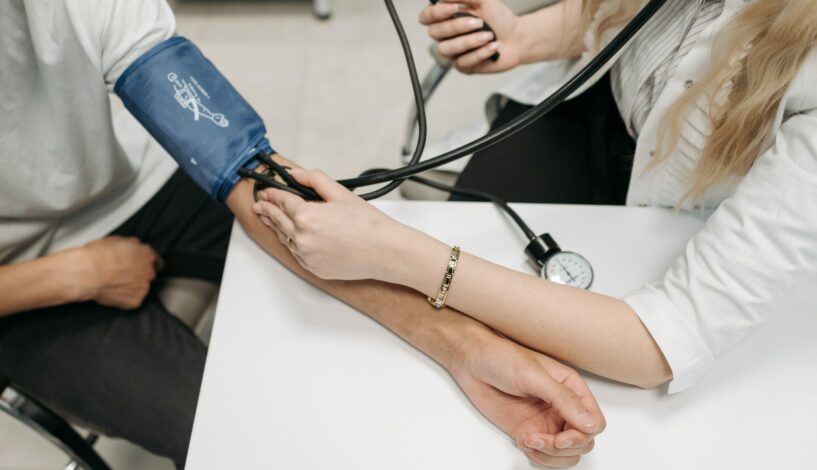
Here’s 7 Ways You Can Reduce Blood Pressure At Home
Hypertension is nothing to get worked up into a sweat about — but only because you don’t want to make an already concerning problem even worse by, well, getting worked up into a sweat. Hypertension, or high blood pressure, describes a condition in which your blood pumps against your arterial walls with too much force. This abnormal amount of pressure strains the heart and could lead to a number of serious problems within the cardiovascular system and even other parts of the body.
According to the CDC, high blood pressure usually doesn’t develop overnight. Your age, sex, and ethnicity can heighten your vulnerability to the condition, as well as any family history of hypertension. Diabetes increases risk for high blood pressure, too, and even more so if combined with lifestyle choices such as an unhealthy diet, obesity, being sedentary, or excessive consumption of alcohol or tobacco.
What should you do after you’re diagnosed with high blood pressure? What lifestyle changes should people with hypertension make? Getting any new diagnosis is bound to be frightening, but there are steps that you can take to lower high blood pressure. Your physician may want to be involved in developing an action plan specific to your condition and overall health, but here are a few tips to keep blood pressure down without medication to keep you started.
Tip 1: Tackle smoking cessation once and for all.
The CDC says that most smokers do want to shake the habit, and that over half will try to do so each year. However, less than 10% of those attempts will be successful. Cigarette smoking has long been associated with high blood pressure, but the consequences are greater than that. Prolonged smokers are at risk of plaque buildup in the arteries, a condition called atherosclerosis which can be sped up by hypertension.
Tip 2: Get your body moving.
Introducing physical activity into your weekly routine can help level out blood pressure numbers. This is because your heart needs exercise to get stronger just like any other muscle in your body. A more fit heart doesn’t need to work as hard to push blood through the vascular system — thus lowering blood pressure. You certainly don’t need to sign up for CrossFit or a half-marathon tomorrow, though; a more active lifestyle can have as humble of beginnings as short walks in your neighborhood or light aerobic swimming.
Tip 3: Nix that sodium.
We can’t deny the deliciousness of a heap of salty French fries, but avoiding these kinds of foods can help in daily management of high blood pressure. When there’s excess salt in your diet, this triggers a retention of water. That extra fluid means more volume in the blood, and a greater force exerted on your arteries. Sticking to a low sodium diet can feel like a hassle especially if you do a lot of dining out, but a vast collection of low-sodium recipes for hypertension exists online to help you make that transition.
Tip 4: Leave the alcohol on the shelf.
Excessive alcohol consumption triggers the production of a hormone that constricts your blood vessels and encourages fluid retention. A greater volume of fluid in the blood and reduced diameter of your blood vessels is a perfect storm for blood pressure spikes. Making an effort to reduce your drinking to no more than three drinks per week — or cutting out spirits altogether— would likely lead to significantly improved blood pressure provided that there aren’t other risk factors you’re impacted by.
Tip 5: Let the stress roll off your shoulders.
We know, that’s easier said than done. Stress doesn’t exactly have an on and off switch, especially when issues with family, jobs, or finances can’t be remedied with the snap of your fingers. A cocktail of hormones surges through your body during times of high stress. Your heart may beat faster, and your vessels may be constricted. Blood being moved at a greater force through a smaller space spells — you guessed it — hypertension. And while this is usually a short-term spike, taking steps to reduce stress (or, at least cope with it better) can help smooth out those jumps.
Tip 6: Audit your diet.
A whole, nutritious diet is a valuable tool in combatting hypertension. When you spend a long time relying on a diet that is high in fat and cholesterol, you’re taking on the risk of plaque buildup that obstructs your blood flow. When vessels are blocked, the heart must work harder to force blood past the blockages. A poor diet can also lead to obesity, which may also be a risk factor for high blood pressure. Try to incorporate plenty of whole grains, lean protein, and fresh produce into your diet for lasting blood pressure support.
Tip 7: Take a breath.
While there are definitely other measures that should be taken in urgent cases of hypertension, a great way to try lowering blood pressure at home is to incorporate some breathing exercises and easy meditation techniques into your daily routine. Daily breathing has been shown to support moderate improvements in blood pressure. Set aside just a couple minutes in a quiet corner of your home or office for slow, deep breaths. Many smartphones and smartwatches have a meditation assistance feature, or you may be able to find guides through online videos or mobile applications.
Dr. Sarika Aggarwal, Chief Medical Officer at Fast Pace Health expounds on the importance of Hypertension detection. “At Fast Pace we have made ‘Elevated High Blood pressure without Hypertension’ and Hypertension’ as the priority medical conditions for 2023. All our providers and care teams have been trained to assess, treat, and monitor hypertension with evidence-based protocols that provide each of our patients with a customized care plan consisting of both lifestyle interventions as well as pharmacotherapy. This whole person approach aims at addressing blood pressure for our patients at every visit and every clinic in the Fast Pace enterprise including urgent care, primary care, or ancillary care.”
For more information or to schedule care, go to: https://fastpacehealth.com/
Related Resources


